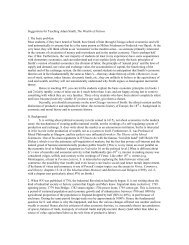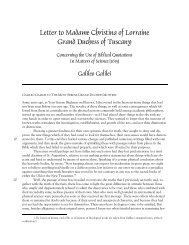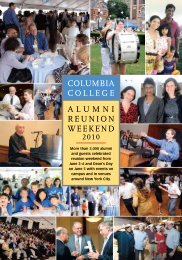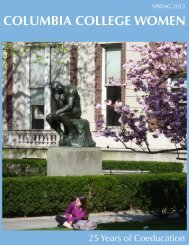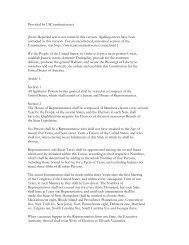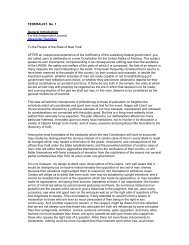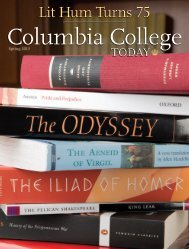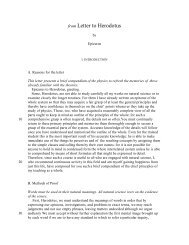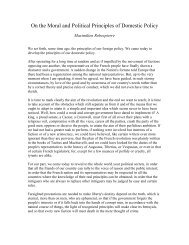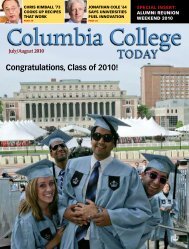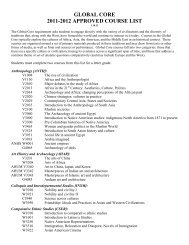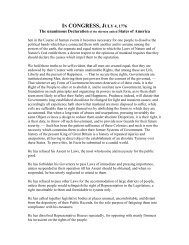Japan Storm - Columbia College - Columbia University
Japan Storm - Columbia College - Columbia University
Japan Storm - Columbia College - Columbia University
You also want an ePaper? Increase the reach of your titles
YUMPU automatically turns print PDFs into web optimized ePapers that Google loves.
CLASS NOTES COLUMBIA COLLEGE TODAY<br />
creasing concern to me throughout<br />
my professional career: end-of-life<br />
problems faced by patients and<br />
their families. Scientific and technological<br />
advances in medical care<br />
have altered the dying experience<br />
for many patients. Death, which<br />
often came almost unheralded<br />
after an acute medical episode, is<br />
now more likely to be postponed<br />
for many years. This is a welcome<br />
development when it means added<br />
years of vitality and enjoyment of<br />
life. In some instances, however,<br />
the technical skills available in<br />
the medical armamentarium take<br />
the patient beyond these enjoyable<br />
added years into a prolonged<br />
period of difficult-to-control<br />
symptoms and what has come to<br />
be known as ‘existential suffering.’<br />
How society deals with such<br />
problems has become a major issue<br />
in end-of-life care.<br />
“The confrontation with death<br />
can be difficult for all of us in our<br />
various roles as physicians, nurses,<br />
parents of children and children of<br />
parents — uneasy at best and terrifying<br />
at worst. I have been struck<br />
by the observation that persons<br />
nearing the end of life may come to<br />
terms with death more readily than<br />
family and friends — more readily<br />
even than nurses and physicians.<br />
“Is it always in the best interest<br />
of the patient to do everything possible<br />
to extend life? Are there some<br />
occasions when our energetic efforts<br />
with ventilators, dialysis and tube<br />
feeding are merely prolonging the<br />
dying process, rather than extending<br />
life in a way that is meaningful<br />
for the patient? Such questions<br />
are being asked with increasing<br />
frequency. The answer is different<br />
for every patient but, whenever<br />
possible, the answer must come not<br />
from those who love the patient or<br />
are providing professional care but<br />
directly from the patient.<br />
“Even the best physicians using<br />
the most advanced technical<br />
tools cannot defeat death, but the<br />
instinct to hold death at bay as<br />
long as possible is strong in the<br />
medical profession; some of us<br />
want to fight to the bitter end — an<br />
end that may indeed be bitter for<br />
some patients. Happily, in recent<br />
years, a more nuanced approach<br />
has evolved. The growing number<br />
of hospice programs represents<br />
a major resource committed to<br />
caring for patients at home and<br />
helping them to get the best out<br />
of their final months and weeks.<br />
Hospitals are developing palliative<br />
care programs that offer control of<br />
symptoms at a stage when persistent<br />
efforts to combat disease may<br />
result in pointless suffering.<br />
“More than a decade ago, shortly<br />
after my official ‘retirement,’ seeking<br />
an opportunity to contribute<br />
to society’s approach to such prob-<br />
lems, I co-founded Compassion &<br />
Choices of New York (compassion<br />
andchoicesofny.org), an affiliate of<br />
the national organization Compassion<br />
& Choices (compassionand<br />
choices.org). A small team of professionals<br />
and volunteers, supported<br />
by a dedicated board of directors,<br />
is helping to make a difference. We<br />
work with patients who are nearing<br />
the end of their lives, helping them<br />
and their families to cope with<br />
many problems they face.<br />
“What does the patient understand<br />
about her/his illness? What<br />
does she feel about it? What practical<br />
problems must be addressed?<br />
Has she completed an advance<br />
directive (health care proxy and a<br />
living will)? Is she suffering pain,<br />
shortness of breath, nausea, vomiting,<br />
anxiety, fear? Has she sought<br />
hospice care? Occasionally a patient<br />
in an advanced stage of disease<br />
experiences distress that cannot be<br />
relieved even by skillful palliative<br />
techniques and will seek to hasten<br />
the moment of her death. What can<br />
be done within the limits of the law<br />
to advise and help such patients?<br />
These are among the problems that<br />
our organization seeks to address.<br />
“Beyond one-on-one relationships<br />
with patients and families,<br />
Compassion & Choices is active<br />
in community education and in<br />
promoting legislation in New York<br />
that will strengthen society’s ability<br />
to address these problems. We were<br />
instrumental in developing the Palliative<br />
Care Information Act and the<br />
Family Healthcare Decisions Act,<br />
both of which became New York<br />
State law in 2010. These current<br />
multi-pronged efforts, including<br />
individual counseling, legislation<br />
and education of the public and<br />
health care professionals, represent<br />
significant steps toward a more<br />
thoughtful and humane approach<br />
to end-of-life care.”<br />
Join the discussion and send your<br />
comments and thoughts on this<br />
subject to me. They will appear in<br />
this column.<br />
Irving Ackerman wrote from<br />
Los Angeles: “I listened to the conversation<br />
(on TV; also available<br />
online: video.pbs.org/video/2008<br />
416709) with Richard Heffner and<br />
former Dean Michele Moody-<br />
Adams and found it most interesting.<br />
I, too, felt the four terms of the<br />
Core Curriculum were eye-openers<br />
and mind-enhancers that I thoroug-<br />
hly enjoyed taking and that have<br />
made a great and good difference in<br />
my subsequent thinking and how I<br />
view the world.”<br />
Irv practiced medicine at Massachusetts<br />
General Hospital and for<br />
many years with Kaiser Permanente<br />
in Los Angeles. He recalls<br />
medical school at P&S with Warren<br />
Glaser and Martin Silbersweig.<br />
I ran into Fritz Stern, whose dis-<br />
tinguished <strong>Columbia</strong> CV includes<br />
<strong>University</strong> Provost and <strong>University</strong><br />
Professor (emeritus). Author of<br />
highly regarded works on Germany<br />
and Europe, he continues globehopping<br />
for lectures and conferences<br />
and keeps adding to his list of<br />
awards and honors.<br />
I received a note from Paul<br />
Rotondi, who now is retired as<br />
CEO and chairman of Washington<br />
Savings Bank in Hoboken, N.J.<br />
REUNION MAY 31–JUNE 3<br />
ALUMNI OFFICE CONTACTS<br />
ALUMNI AFFAIRS Nick Mider<br />
nm2613@columbia.edu<br />
212-851-7846<br />
DEVELOPMENT Allen Rosso<br />
ar3152@columbia.edu<br />
212-851-7947<br />
47<br />
WINTER 2011–12<br />
56<br />
<strong>Columbia</strong> <strong>College</strong> Today<br />
<strong>Columbia</strong> Alumni Center<br />
622 W. 113th St., MC 4530<br />
New York, NY 10025<br />
cct@columbia.edu<br />
Merton Reichler, of East Setauket,<br />
N.Y., writes, “At 85, after a career<br />
of college teaching (since 1962 at<br />
SUNY Stony Brook), I now teach<br />
Roman history and the early U.S.<br />
Supreme Court in our large (800plus)<br />
senior citizen organization,<br />
which used to be called The Round<br />
Table but is now (due to a large<br />
grant) called the Osher Lifelong<br />
Learning Institute.<br />
“I have had three wives (all<br />
deceased) and have three adult children<br />
and six grandchildren, plus a<br />
wonderful companion; she is retired<br />
from college teaching of English and<br />
American literature. So far, as you<br />
can see, my health is good enough<br />
to permit these activities, so I need<br />
no others.<br />
“My favorite professors at <strong>Columbia</strong><br />
were Larry Chamberlain,<br />
Dwight Miner ’26 and Lionel Trilling<br />
’25. In essence, they taught me<br />
to read critically. When I was at the<br />
<strong>College</strong>, there was no ‘Core’ — or,<br />
in a way, it was all Core.”<br />
CCT also heard from Charles<br />
(Chuck) Greenwood Wootton of<br />
San Diego. “I’m a retired American<br />
diplomat and Chevron international<br />
public affairs coordinator. I’m<br />
an active volunteer, currently as an<br />
Oasis Reading Tutor of secondgraders,<br />
and was honored to be<br />
named 2011 Volunteer of the Year<br />
by the San Diego Unified School<br />
District.<br />
“I consider the Core the high<br />
point of my undergraduate experience.”<br />
George L. Kline ’50 GSAS wrote:<br />
“I can’t pick a single favorite <strong>Columbia</strong><br />
professor. Let me rather mention<br />
half a dozen professors whose<br />
courses I recall with special warmth<br />
and gratitude: Joseph Wood Krutch<br />
’24 GSAS (18th-century English<br />
literature); Rose Raskin and Leon<br />
Stilman ’52 GSAS (Russian language<br />
and literature); André von Gronicka<br />
’42 GSAS (Goethe and Schiller);<br />
Meyer Schapiro ’24, ’35 GSAS (20thcentury<br />
painting); and John Herman<br />
Randall Jr. ’18, ’22 GSAS (history of<br />
philosophy). Von Gronicka, born in<br />
Moscow of a Russian mother and<br />
a Baltic German father, taught my<br />
first college course in Russian. Later<br />
both Randall and von Gronicka were<br />
helpful members of my dissertation<br />
committee. I was happy to be able<br />
in 1967 to contribute an essay to<br />
Randall’s Festschrift.<br />
“Another <strong>Columbia</strong> professor<br />
whom I recall warmly and admiringly,<br />
though I never took a class<br />
from him, was F.W. Dupee. We<br />
co-taught Senior Colloquium in<br />
1958–59 and took turns introducing<br />
the works to be discussed.<br />
Thus, Dupee, the English professor,<br />
would introduce Hegel, and I, the<br />
philosophy (assistant) professor,<br />
would introduce Dickens. We had a<br />
brilliant group of students, among<br />
them David Rosand ’59, ’65 GSAS,<br />
now the Meyer Schapiro Professor<br />
of Art History Emeritus at <strong>Columbia</strong>,<br />
and Erwin Glikes ’59, alas no<br />
longer with us, who was president<br />
and publisher of Basic Books.<br />
“The Core Curriculum was a<br />
treasure. As a returning veteran,<br />
I fell in love with the sweep of<br />
Humanities A (from Homer to<br />
Dostoevsky). Teaching that course<br />
several times between 1950 and<br />
1959 was for me a tough but exciting<br />
‘learning experience.’<br />
“As for my current work: 1) I’m<br />
trying to complete the Kline Archive<br />
at Yale’s Beinecke Library: corres-<br />
pondence with Joseph Brodsky<br />
(Nobel laureate 1987) and with<br />
other Russians, drafts of talks and<br />
translations and so forth; 2) I’m<br />
revising my Joseph Brodsky: Selected<br />
Poems (with foreword by W.H.<br />
Auden, 1973) for republication by<br />
Farrar, Straus and Giroux; and 3)<br />
I’m working on the 40th article I’ve<br />
produced since retiring from Bryn<br />
Mawr <strong>College</strong> in 1991. Meantime,<br />
my patient wife, Virginia, has put<br />
up with me for almost 69 years.”<br />
Former CCT correspondent Bert<br />
Sussman’s wife, Shirley ’46 GSAS,<br />
passed away on October 30. She<br />
earned a master’s in public administration<br />
from <strong>Columbia</strong>, and her<br />
mentor was Professor McMahon.<br />
In 1946, Shirley was administrative<br />
assistant to first-term Rep.<br />
Jacob Javits (R-N.Y.) and at JFK’s<br />
request set up his office as she did<br />
the Javits office across the hall from<br />
JFK. She was part of the team that<br />
wrote the Marshall Plan. Says Bert,<br />
“Understatement of the century: It<br />
was my privilege and pleasure to<br />
have loved her.”<br />
Share your memories and news<br />
with classmates by sending a Class



